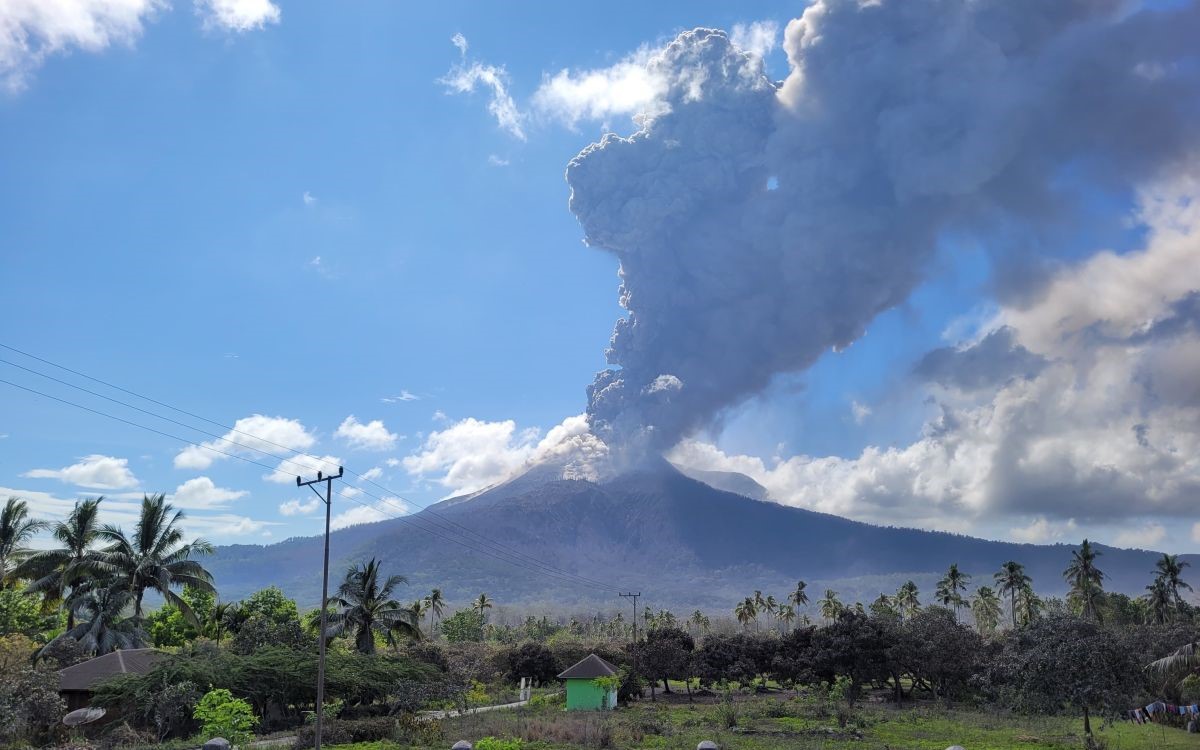A series of international airlines have grounded flights to and from Bali as a massive ash cloud from Mount Lewotobi Laki-laki blankets parts of the region, raising significant safety concerns. The powerful eruption, which took place over the weekend, sent volcanic ash towering 9 kilometers (6.2 miles) into the atmosphere and is now affecting air travel in and out of one of Indonesia’s most popular tourist destinations. The decision to cancel flights underscores the unpredictable nature of volcanic activity and the high stakes involved in maintaining aviation safety amidst natural disruptions.
Among the airlines impacted by the eruption are prominent carriers including Qantas, Jetstar, and Virgin Australia, which on Wednesday began advising passengers of potential travel disruptions. The thick ash from Mount Lewotobi Laki-laki, located near Bali, poses a serious hazard to aircraft, reducing visibility and potentially damaging engines if particles are ingested mid-flight. Following the eruption, Virgin Australia released a statement reiterating its commitment to passenger safety: “Safety is always our highest priority, and our meteorology team is closely monitoring the situation.” The airline, along with several others, has taken proactive steps to halt flights as a safety measure until the volcanic conditions improve.
In addition to Virgin Australia, the Australian carriers Qantas and Jetstar have also adjusted their schedules in response to the latest volcanic threat. Jetstar announced that all flights to and from Bali would be suspended until at least 12:00 p.m. Australian Eastern Daylight Time on Thursday (04:00 GMT). International airlines, including Cathay Pacific from Hong Kong, IndiGo from India, and Malaysia’s AirAsia, have also chosen to suspend operations temporarily, emphasizing the broad scope of the disruption and the international attention the eruption has drawn.
The Australian Bureau of Meteorology issued warnings that the volcanic ash may drift as far as northern parts of Australia by Wednesday, further underscoring the potential scale of the eruption’s impact. Bali, a hub for both regional and international travelers, is accustomed to handling large passenger volumes, especially during peak travel periods. This sudden disruption is, therefore, a considerable setback for the tourism sector and for travelers eager to experience the renowned attractions Bali has to offer. While some airlines, including Singapore Airlines and its low-cost subsidiary Scoot, have managed to keep a limited number of flights in operation, the cancellations have nonetheless created significant challenges for air traffic flow in and out of Bali’s Ngurah Rai International Airport.
The airport’s general manager, Ahmad Syaugi Shahab, confirmed that 22 international flights and 12 domestic routes were impacted as of Tuesday, with a high likelihood that additional flights would face delays or cancellations if the ash cloud persisted. Although authorities are doing their best to keep travelers informed, the evolving situation has forced many to make last-minute changes to their travel plans. The safety protocols are essential in ensuring passenger well-being, though the resulting inconvenience has been keenly felt by both travelers and tourism operators.
The ash fallout has also had broader implications for Indonesia’s entertainment and cultural events. In Labuan Bajo, a town located approximately 600 kilometers from Mount Lewotobi Laki-laki, a jazz festival that was scheduled to take place this week has now been postponed until next year, with organizers citing safety concerns due to the ash as the primary reason for the delay. Such cancellations have highlighted the ripple effect volcanic activity can have, even at great distances from the eruption site.
Indonesia is home to approximately 130 active volcanoes and lies on the Pacific “Ring of Fire,” a region notorious for its intense seismic and volcanic activity. The country’s geological landscape, while stunning, presents unique challenges, as volcanic eruptions in the past have frequently disrupted air travel. In 2020, Mount Merapi’s eruption in Central Java led to the temporary closure of an airport in Solo, adding to a long history of incidents where volcanic activity has impacted aviation in the archipelago. Indonesian authorities continue to monitor these natural hazards closely, working with international airlines and meteorological experts to assess and respond to ongoing risks.
As the situation unfolds, airlines, airport authorities, and travelers are left to navigate the challenges posed by nature’s unpredictable power, with safety remaining the foremost priority amidst the ash cloud’s lingering presence over Bali.









